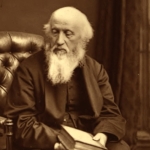The time is come, I must depart
from thee, ah famous city;
I never yet to rue my smart,
did find that thou had’st pity.
Wherefore small cause there is, that I
should grieve from thee to go;
But many women foolishly,
like me, and other moe,
Do such a fixèd fancy set,
on those which least deserve,
That long it is ere wit we get
away from them to swerve.
But time with pity oft will tell
to those that will her try,
Whether it best be more to mell,
or utterly defy.
And now hath time me put in mind
of thy great cruelness,
That never once a help would find,
to ease me in distress.
Thou never yet would’st credit give
to board me for a year;
Nor with apparel me relieve,
except thou payèd were.
No, no, thou never did’st me good,
nor ever wilt, I know.
Yet am I in no angry mood,
but will, or ere I go,
In perfect love and charity,
my testament here write,
And leave to thee such treasury,
as I in it recite.
Now stand aside and give me leave
to write my latest will;
And see that none you do deceive
of that I leave them till.


















Comment form: